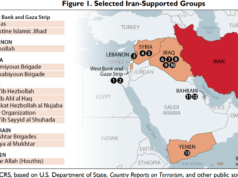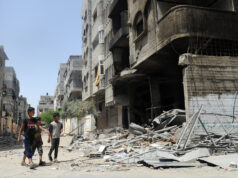Two years after Israeli Prime Minister Ariel Sharon unilaterally pulled Israel out of the Gaza Strip, his controversial disengagement policy is now widely viewed as a mistake. It has left a terrorist mini-state on Israel’s doorstep, now that Hamas controls the Gaza Strip. Terrorists regularly fire rockets into Israel from Gaza while Hamas amasses an army that could pose a significant threat to the Jewish state. Will Israel return to Gaza?
The Failed Logic of Retreat
The evolution of the Gaza Strip into “Hamastan” is no surprise. Israeli military officials predicted the rise of an Islamist terrorist state prior to the disengagement. Outgoing Israel Defense Forces Chief General Moshe Ya’alon, for example, warned that he expected, “terrorist attacks of all types: shooting, bombs, suicide bombers, mortars, Qassam rockets…there is a high probability of a second war of terror.”
Sharon, however, believed the cost in dollars and lives required to protect 9,000 Jews living amidst some 1.5 million angry Palestinians did not outweigh the benefits of consolidating Israel’s defense around Gaza. Sharon further recognized the demographic dilemma of remaining there. Annexing Gaza would only guarantee that the fast-multiplying Palestinians would become either a majority in Israel, or such a significant minority that Israel would be forced to choose between its Jewish character and its democracy.
Sharon also believed withdrawal would yield public relations benefits. Israel could claim to have satisfied Palestinian and international demands to “end the occupation” in Gaza. This argument was undercut, however, when Israel acted unilaterally rather than negotiating. The Palestinian public relations machine portrayed Israel as creating a ghetto by confining the Palestinians to the impoverished territory while maintaining control of land, air, and sea passages.
The most optimistic view of disengagement was that the Palestinians would begin to build in Gaza the state they claimed to have sought for some six decades. The international community showered money on the corrupt Palestinian Authority. Israel even left behind technologically innovative greenhouses that Jewish settlers built to grow flowers, fruits, and vegetables. Indeed, the settlers, who were paid off by American Jews to facilitate this gift, handed Gaza a multimillion-dollar export industry. Fast forward two years, and most of the greenhouses have been torched and looted. The opportunity for Gazans to export something other than terrorism was squandered.
Random Rockets
Four years prior to disengagement, nearly 1,000 Israelis were killed in terror attacks. Of those, approximately 150 Israelis, including 57 civilians, were killed by Gaza Palestinians. In the last two years, by contrast, fewer than 60 Israelis have been killed, and “only” four civilians have died in the Israeli town of Sderot, which sits close to Gaza’s northeast border. But the lack of bloodshed has not been from a lack of trying. Terrorists have launched some 1,500 Qassam rockets into Israel over the last two years. They simply cannot yet aim their rockets with accuracy or consistency.
Sderot has suffered greatly. Qassam rockets fired randomly from behind the Gaza border often strike Sderot’s schools and houses, and constantly threaten the lives of its citizens. Thousands of residents, no longer willing to live under these conditions, have abandoned the town.
Israelis openly wonder how Prime Minister Ehud Olmert can allow Israeli citizens to be terrorized. If rockets were falling in Tel Aviv or Jerusalem, the government would not show similar restraint.
Reconciling with Reality
For the last two years, the Israel Defense Forces have restricted their responses to mostly pinpoint strikes on rocket labs and launch sites. These limited actions have killed nearly 600 terrorists and 54 civilians. Since Hamas took over Gaza, however, Israeli officials are openly mulling more drastic measures.
There are several reasons for this increased concern. First, the Hamas takeover in Gaza drastically altered the belief that disengagement was yielding benefits for Israel. The initial hope that the Palestinians would view Israel’s withdrawal as a trust building measure that could lead to peace has evaporated. Many Israelis now see disengagement as a failure; they believe withdrawal only earned Israel more violence.
It is also important to note that disengagement from Gaza was unilateral because of the belief that Israel had no partner with whom to negotiate. Jerusalem assessed that Palestinian Authority President Mahmoud Abbas did not have the will or ability to negotiate an agreement, or to stop Palestinian violence. This Israeli assessment proved accurate. Today, Abbas has no control over Gaza, and desperately clings to power in the West Bank. Hamas, having seized Gaza, offers no hope for resuming peace talks. Indeed, its raison d’être is the destruction of Israel. So while there was some initial hope that Israel could coexist with the Palestinians in Gaza after disengagement, now there is virtually none.
Rationale for Re-Occupation
With Hamas in control of Gaza, re-occupation may be the only card left for Israel to play. As long as Gaza is under Hamas control, comprehensive peace will never be achieved. In the meantime, Gazans will not stop firing rockets into Israel. Moreover, they are expected to improve the accuracy and lethality of their weapons. Some rockets have come close to the power plant in the Israeli town of Ashkelon. It is only a matter of time before the Palestinians acquire more advanced rockets that can reach Jerusalem or Tel Aviv.
A more worrisome development for Israel is that Hamas is building an army. Prior to the Gaza coup, Israel did not consider Hamas a serious armed threat because the group had only about 5,000 forces. Israeli officials now estimate that Hamas has 13,000 troops, some of whom are now training in Iran. Hamas even announced its recent creation of a navy. These armed forces are further bolstered by subterranean smuggling operations beneath the Gaza-Egypt border that yield tons of arms, ammunition, and sophisticated weapons, such as anti-tank missiles. But this army does not necessarily seek a conventional military victory. Its fighters are content to inflict heavy casualties on Israeli forces and are prepared to die as “martyrs” if necessary.
Israel’s Options
Israeli officials are now dogged with the issue of how to respond to these growing threats. Options boil down to the following:
» Strangulation. Ya’alon is among those who advocate treating Hamastan as an “enemy entity.” He believes that Israel should cut off water, electricity, and other utilities in Gaza. He and others find it absurd that Israel should provide material support to a regime that seeks to destroy it. This approach, however, would be viewed worldwide as collective punishment against the civilian population in Gaza, and guarantee an international backlash against Israel. It should be noted, however, that the Palestinian people would not actually starve or face deprivation if Israel were to cut off Gaza’s services. Muslim and Arab states, not to mention numerous international donors, would likely provide for their needs. Even today, with an international aid embargo, Hamas has smuggled in millions of dollars from Iran and other patrons, but only its fighters and leaders have benefited.
» Call for foreign deployment. Numerous Israeli leaders have argued for a foreign force, either between Israel and Gaza, or along the Philadelphi Road, a 200-meter-wide strip separating Gaza and Egypt. Israelis do not trust the United Nations, primarily because UNIFIL (United Nations Interim Force in Lebanon) has been utterly ineffective in preventing Hizbullah from rearming and threatening Israel. A NATO force deployment, as suggested by Minister of Strategic Affairs Avigdor Lieberman, would be far more credible, but the member nations show no interest in a deployment that would make their soldiers targets of Hamas terrorists. They are, therefore, unlikely to position troops where Hamas could target them. This would render the NATO force ineffectual.
» Continue limited operations. Israel’s Deputy Defense Minister Matan Vilnai is one of several defense officials who favor a limited response. These officials seek to reduce the threat of rockets, while simultaneously minimizing Israeli casualties (and political criticism). They argue that Israel can continue pinpoint strikes on rocket labs and launching sites and assassinate Hamas leaders but keep its troops on the Israeli side of the border. This option, however, would not prevent Hamas from growing.
» Re-occupy part of Gaza. Israel could seize territory along the Gaza border to create a buffer zone in the northern Gaza Strip that would minimize the danger from Qassam rockets. Israel could also redeploy along the Philadelphi Corridor to stop Palestinian smuggling operations that continue to replenish the Hamas arsenal. The latter idea is favored, for example, by former national security adviser Giora Eiland who believes preventing smuggling must be Israel’s top priority. While popular in Israel, both approaches have only limited utility. Neither would weaken the existing Hamas infrastructure in Gaza, nor strengthen Israel’s defenses significantly.
» Temporarily re-occupy the Gaza Strip to attack Hamas. No one doubts Israel has the capability to overrun the entire area, but few Israelis have the stomach to once again control the lives of 1.5 million Palestinians. Ironically, Hamas hopes Israel will choose this path. Indeed, the terrorist group would like nothing better than to lure Israeli soldiers into the refugee camps where its fighters can hide behind civilians and inflict heavy casualties on its enemy. Despite its best efforts, Israel would kill many innocents in a Gaza incursion, and once again be pilloried internationally. Meanwhile, Hamas rockets would shower Israel and terrorize the population in the south. Peace talks with Abbas would be sabotaged. The fallout would be significant.
Nevertheless, a large-scale operation will ultimately be necessary if Israel is to ever defeat Hamas. Israel must execute a blitzkrieg attack on Hamas strongholds, destroy much of the Hamas infrastructure, and capture or kill a significant percentage of its fighting force. Israel must then leave promptly after those objectives are met. Israel cannot afford another unsuccessful military operation, such as the Lebanon war against Hizbullah last summer.
Inevitable Confrontation
Israel is most likely to bide its time and to choose the option of limited operations from outside the Gaza Strip to reduce the threat from Hamas, while tolerating continued rocket attacks. Simultaneously, Israel will cooperate with Washington to undercut and isolate Hamas, while working to shore up Abbas’ power in the West Bank. In this way, Israel could minimize Palestinian threats from the West Bank and isolate Gaza as its primary Palestinian threat.
This scenario is dangerous, however. Under these conditions, Hamas will continue to grow stronger until it either launches an attack that necessitates a large scale response, or amasses enough military strength that the IDF believes it can wait no longer to launch a major offensive.
Either way, confrontation is a foregone conclusion. As such, temporarily reoccupying Gaza is the only option that can eliminate the long-term threat of Hamastan. Unfortunately, this is also the least popular option. Israel has difficult choices ahead.
Mitchell Bard is a foreign policy analyst and director of the Jewish Virtual Library. His latest book is Will Israel Survive? (Palgrave).





